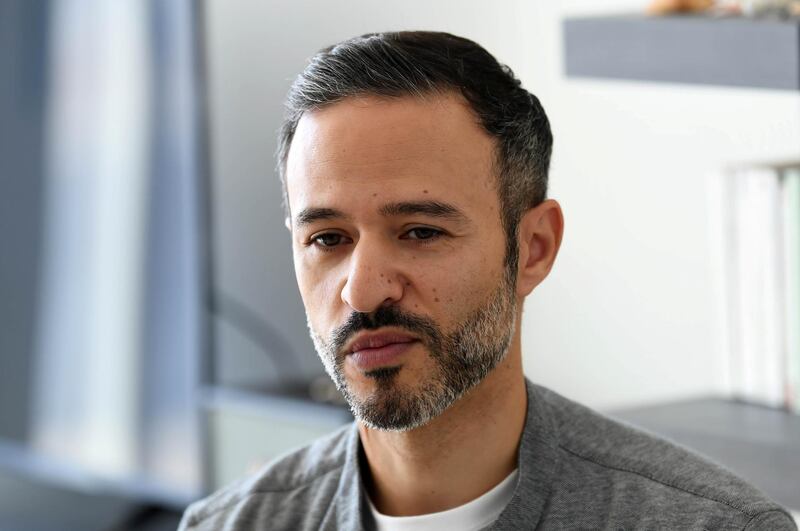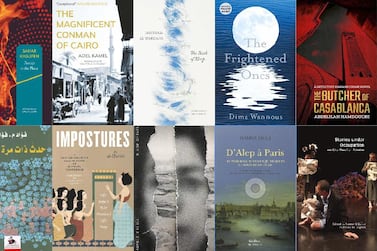To write about dictatorship, exile, war, politics, and the dismantling of a country in simple, sparse sentences, which make you feel, smell, taste, and hear, is no small feat. Yet Franco-Iraqi journalist Feurat Alani has done just that in his graphic novel Le parfum d'Irak (Flavours of Iraq). Published in French in 2018, and recently in Arabic, Flavours of Iraq tells a story in one thousand tweets.
The idea came to Alani during the summer of 2016 when he reached saturation point listening to foreign policy experts analysing the situation in Iraq using statistics, devoid of any notion of what life was like for people on the ground. He got on Twitter and began in the 140 characters allowed at the time, to describe another Iraq, one that showed its human side. "My approach was almost a provocation, without any particular goal, simply to spew out everything I had inside of me," he tells The National.
Alani was born to Iraqi parents and grew up in France. His father, a communist from a devout family in Fallujah, was a student in sociology, and a political refugee who fled to France from Iraq in 1972, while his mother, from a more established family in Baghdad, met his father on a visit to France.
In 1989, just after the end of the Iran-Iraq war, Alani, then nine years old, visited Iraq for the first time. His younger sister and his mother travelled with him, but his father remained in France, unsure whether it was safe for him to visit.
Alani was first impressed by the number of family members who met them at the airport, then at the modernity of the capital – the airport, motorways, street lamps and American cars. His Iraqi cousin whispered to him that one must never say Saddam Hussein's name in the street. Alani's six-year-old sister immediately shouted out his name and both were given a dressing down. It was a wake-up call for Alani that life there was very different from his French existence. After Baghdad, they travelled to Fallujah to visit his father's relatives, a number of whom were in the military.
In hundreds of tweets over summer 2016, Alani described his subsequent visits to Iraq – the turquoise colour of the Euphrates and how children jumped into the river from a green bridge and the taste of cardamom-flavoured nougat and apricot ice-cream. He wrote about his family members and how they coped with everyday situations – the embargo imposed on Iraq in 1990, the questions about his life in France that the children had for him, and how he realised he led a privileged life there. In 1995, Alani's father was able to return to Iraq for the first time, and showed the author his old primary school and told him about how kids would bury watermelons in the riverbed to cool them and fish them out to eat in the evening.
He continued to tweet what was a clear storyline, pulling followers into the heart-breaking reality of daily life as families limped from one difficult situation to a worsening one, with all the grey areas in between. As he continues to visit Iraq over the years, his cousins and other family members in Iraq grow older, too. We follow his cousin Mazen, who accompanied Alani to the hospital when the latter injured his head during a game and needed stitches. Because of the embargo, anaesthesia is scarce, and an older cousin negotiates and pays extra money for Alani to be anaesthetised while he is being stitched up. The author is painfully aware that most people are not so lucky. But for Mazen, this episode was a revelation, and he went on to become a doctor.
Il est encore temps pour un humble petit cadeau. Ne me remercie pas. #noel#leparfumdirak pic.twitter.com/XMvYEDgdO6
— Feurat Alani فرات العاني (@Feurat) December 24, 2018
Alani studied journalism in France, and in 2003, during the first stage of the US invasion, he was encouraged by one of his professors to report from Iraq.
"I arrived [in Iraq] as a Frenchman, with no knowledge of war, yet the exceptional aspect was that thanks to my family and the fact that I spoke the language, meant I could be in the Red Zone [the rest of Baghdad that wasn't in the high-security sector was called the Green Zone]. To be in the Red Zone always had meaning for me. I ended up staying for five years until I got very tired psychologically." About half of Alani's tweets cover the beginning of his professional life in occupied Iraq, post 2003, until the US troops withdrew in 2011.
By the end of the summer of 2016, Alani had a community of followers on Twitter and there was a buzz around his project – he was invited to talk about it by media outlets. He wanted to develop the project with Leonard Cohen, an illustrator who worked in animation for the same television news show Alani was working for. "I was writing about memories, which you can't film, so animation seemed like a way to imagine and reinterpret these memories," he says.
A colleague at a production company decided to go ahead with an animated web series taken directly from Alani's tweets, and a publishing deal for a graphic novel followed soon after. The book was published in early October 2018, and the web series opened that year's Bayeux Calvados-Normandy Awards for war correspondents. The book and web series were very successful, doubtless, in part to Alani's deftness in recounting tragic (but not only) and compelling circumstances in such a spare yet evocative language. "Above all, I wanted to avoid pathos. My journalistic instinct came into play and I always took a step back from what I was writing."
His graphic novel is also being used in French high schools where Alani gives writing workshops. “It has opened so many doors for me,” he says.
Alani's father, who he said was a great inspiration to him, died three weeks before Le parfum d'Irak won France's most prestigious journalistic award, the 2019 Prix Albert Londres. His father was very moved by Alani's memories, and proud, he said. "My parents hadn't realised the impact Iraq had had on me and my sister; they didn't think we would be so imbued with Iraqi culture …"
Alani, who lives in Dubai where he has a documentary film production company, is currently working on a feature-length animated documentary of Le parfum d'Irak, which will take the story up until 2019, with a greater focus on his father.







